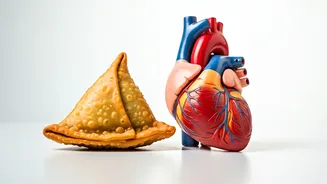Samosa's Hidden Costs
The article brings attention to a cardiologist's warning about the detrimental effects of eating samosas, a common street food, and other unhealthy items.
The discussion highlights the hidden dangers present in these frequently consumed items. The cardiologist draws attention to how these options contribute to developing heart diseases and gives a call to become aware of the implications of one's food choices, particularly in the context of Indian eating habits. They emphasize how seemingly harmless treats can lead to severe health issues. The expert’s view promotes an increased awareness of the need to have a balanced and healthy diet as a preventive measure against heart-related diseases, which are increasingly a matter of public health concern.
The Heart Disease Risk
Consuming samosas frequently poses a significant threat to cardiovascular health. Samosas, with their high fat and carbohydrate content, alongside being deep-fried, contribute to unhealthy cholesterol levels and weight gain. This, in turn, increases the possibility of developing heart diseases such as coronary artery disease and other related conditions. The cardiologist's warning is backed by the understanding that a diet rich in saturated fats and trans fats, which are often found in fried foods, can lead to the buildup of plaque in arteries, ultimately restricting blood flow to the heart. This directly contributes to increased chances of strokes, heart attacks, and other life-threatening events. The article stresses the need for individuals to be aware of the nutritional makeup of the foods they eat, prioritizing those that offer health benefits and supporting cardiovascular wellness.
Making Healthier Choices
To reduce the risk of heart disease, people need to consciously change their eating habits, as emphasized in the article. This involves moving away from high-fat, processed foods like samosas, and embracing a more balanced diet centered on fresh produce, lean proteins, and whole grains. Opting for healthier cooking methods, such as baking, grilling, or steaming, can drastically reduce the intake of unhealthy fats and calories. The article advocates for portion control, mindful eating, and regular physical activity as vital components of a heart-healthy lifestyle. The guidance focuses on creating a sustainable, long-term approach to nutrition and well-being. Individuals are encouraged to seek professional advice from nutritionists or doctors to personalize their dietary plans based on their specific health conditions and needs.
Beyond Samosas Alone
The cardiologist's insights extend beyond the singular focus on samosas to incorporate a broader understanding of overall dietary patterns. The article emphasizes that the issue isn't restricted to one specific food but covers the larger trend of unhealthy eating habits, including consuming highly processed snacks, sweets, and fast food items. These choices, often high in sodium, sugar, and unhealthy fats, collectively damage cardiovascular health. The message encourages people to evaluate their complete diet, paying particular attention to the frequency and portion sizes of unhealthy items. Educating oneself on food labels, making smart choices when eating out, and planning meals in advance are presented as key strategies for successfully implementing a heart-healthy lifestyle. The article’s advice underscores that long-term health is not just about avoiding certain foods but establishing a balanced eating pattern.













